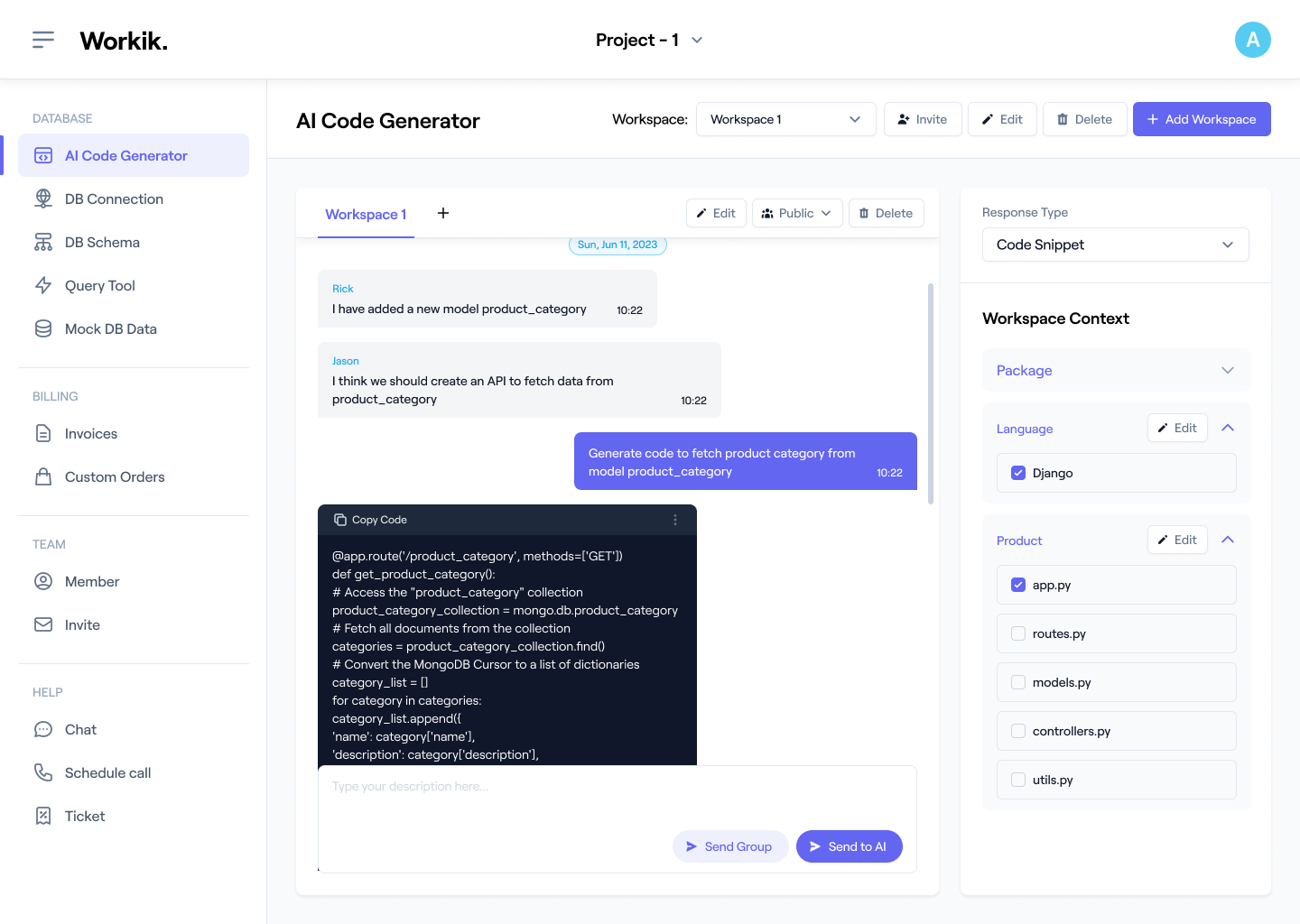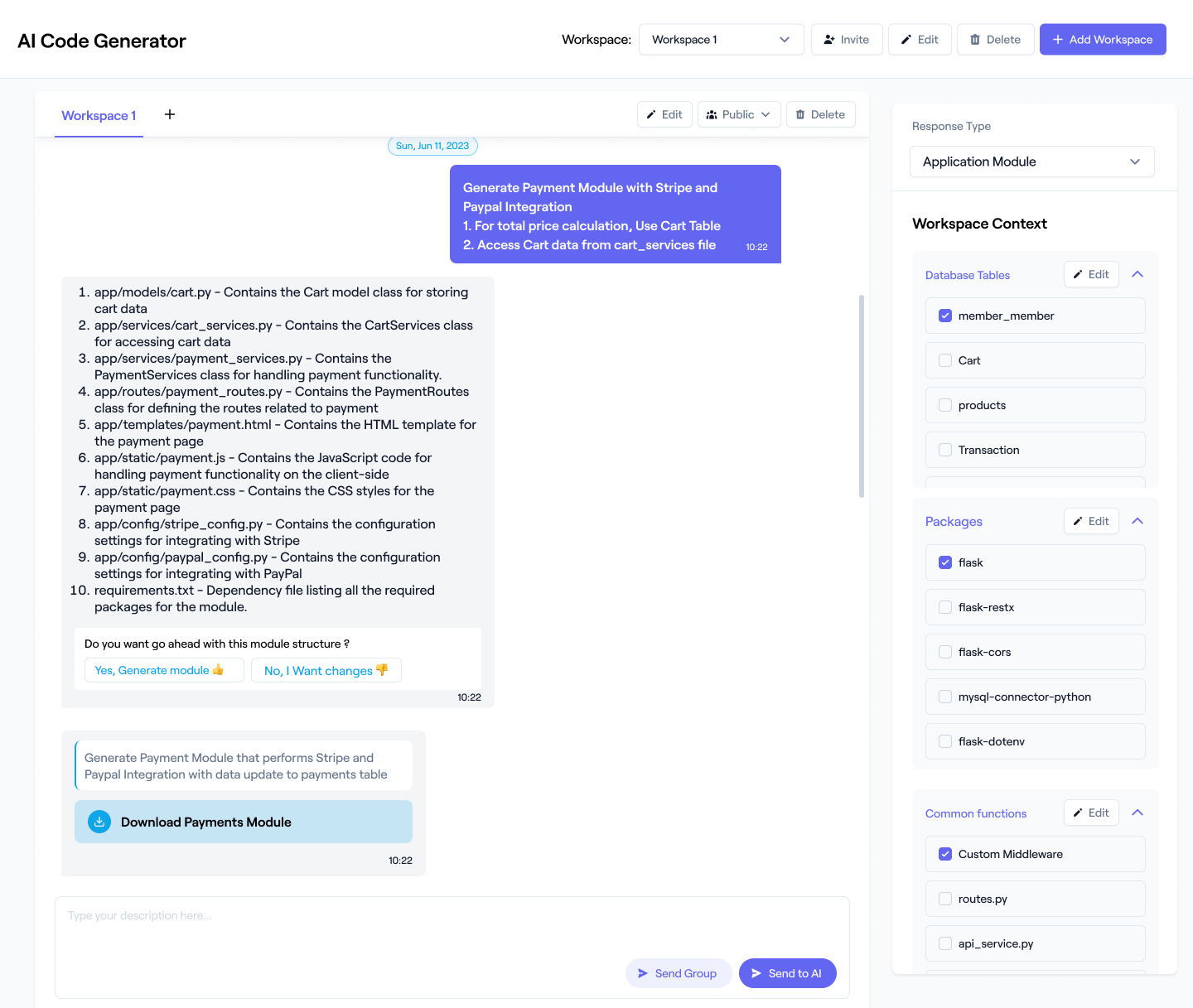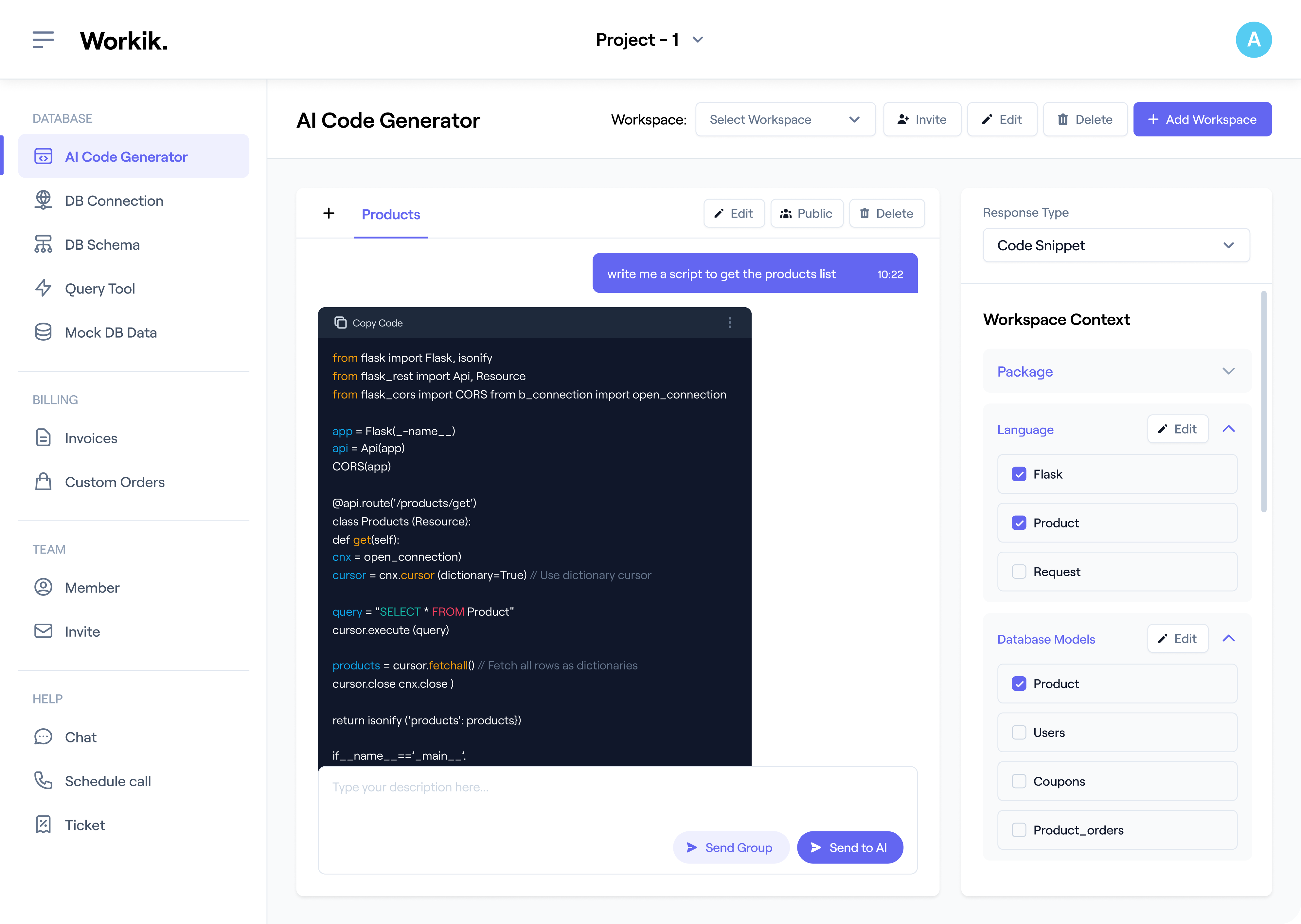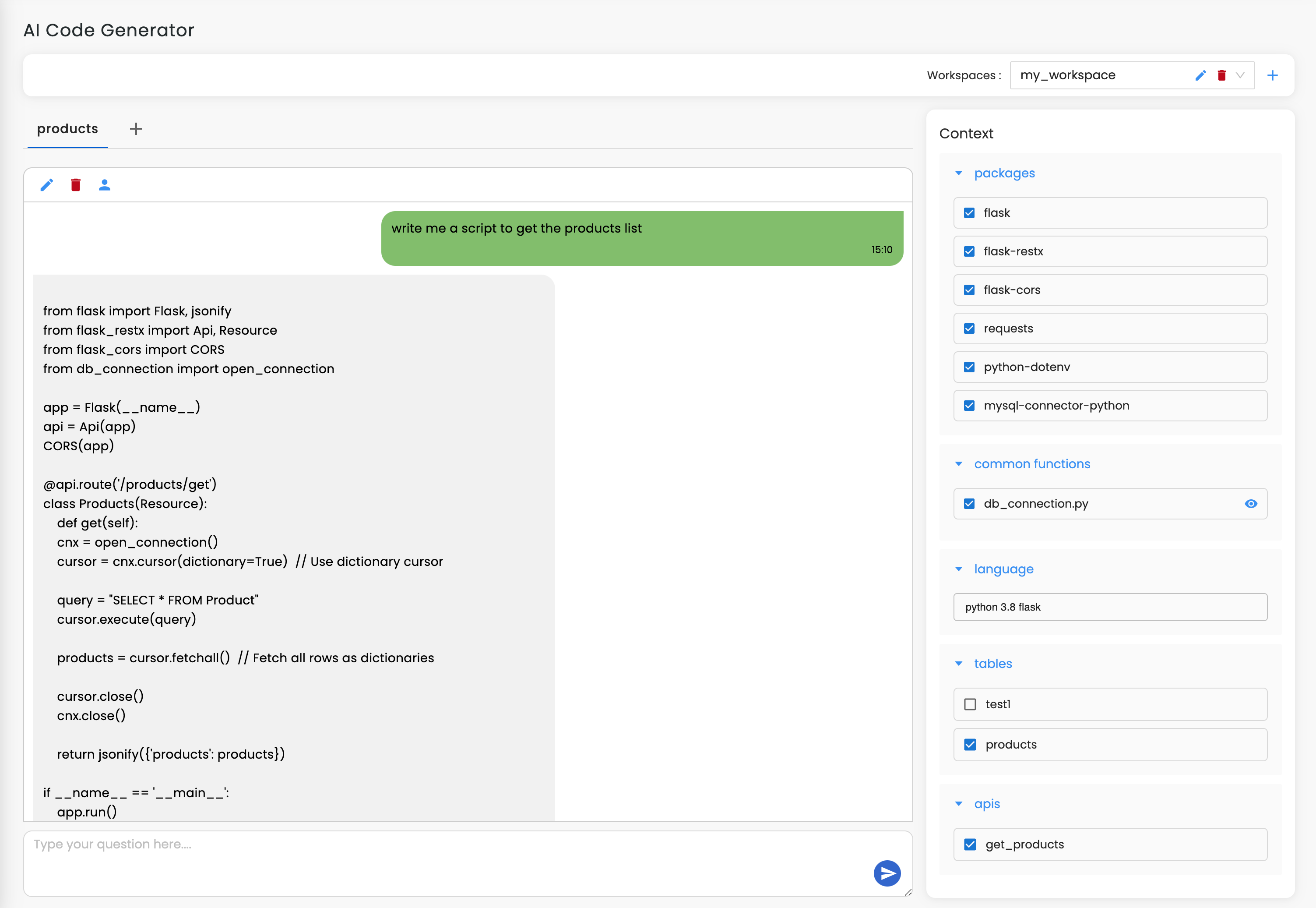
Join our community to see how developers are using Workik AI everyday.
Features

Automate Data Analysis in R
Quickly generate R code for tasks like data manipulation, statistical modeling, and visualizations, saving time on repetitive coding.

Smart Data Visualization
Generate complex visualizations with ggplot2 and plotly. AI suggests optimal charts based on data structure and analysis needs.

Instant Report Generation
Create dynamic reports with RMarkdown and knitr. Automate code, plots, & insights easily.

Effortless Model Building & Tuning
Generate ML models with caret and xgboost. Automate hyperparameter tuning with AI for enhanced accuracy.
How it works
Create your Workik account in seconds and dive into your R coding assistance from AI.
Connect your R projects from GitHub, GitLab, or Bitbucket. Import scripts and datasets. Define libraries like dplyr, ggplot2, shiny, and more for precise AI guidance.
Leverage AI assistance to automate data wrangling, visualization, model building, statistical analysis and more. Get tailored code suggestions based on your datasets and project context.
Collaborate with your team in real-time, share feedback, and deploy it seamlessly. Easily integrate with your existing workflows and share your R insights with your team.


Expand


Expand


Expand


Expand


Expand


Expand


Expand


TESTIMONIALS
Real Stories, Real Results with Workik
Workik’s AI simplifies R coding, letting me focus on insights rather than technical details.

Kelly Johnson
Data Scientist
Automating data prep and testing in R has never been easier with Workik’s AI.

Sandy Wagner
Statistician
Workik AI efficiently streamlines my R workflows, from data preprocessing to model optimization.

Anna Lawson
Machine Learning Engineer
What are popular use cases of Workik AI for R?


Popular use cases of Workik AI for R include, but are not limited to:
1. Automate data cleaning and preprocessing with libraries like dplyr and data.table for efficient handling of large datasets.
2. Create complex visualizations using ggplot2 and plotly with minimal coding effort.
3. Prototype machine learning models quickly with caret and xgboost for faster experimentation.
4. Generate automated reports using RMarkdown, seamlessly integrating code, visualizations, and text.
5. Build and deploy interactive Shiny dashboards, with AI-generated UI components and server logic for robust, responsive web applications.
How does context-setting work in Workik for R programming?


Workik provides diverse context-setting options for R programming, allowing you to:
1. Specify R libraries like stringr, ggplot2, and knitr for precise code suggestions.
2. Connect GitHub, GitLab, or Bitbucket repositories to import existing R scripts and data.
3. Upload database schemas for context-aware R script generation and data queries.
4. Add APIs and custom R functions to guide AI in generating consistent code.
5. Provide sample scripts to align AI outputs with your project’s coding style.
Can Workik AI handle both small and large datasets in R?


Yes, Workik AI generates efficient R scripts optimized for both small and large datasets. It offers memory-efficient techniques and parallel processing to handle big data.
Can Workik AI help with migrating R scripts to new frameworks or libraries?


Yes, AI can refactor and migrate legacy R scripts to use modern libraries like data.table or tidyvr. It identifies outdated code patterns and suggests improvements, making your code faster and more maintainable.
Can I use Workik AI to debug complex R code?


Absolutely. Workik AI can analyze your R scripts to identify potential errors, suggest fixes, and provide explanations for common issues like mismatched data types, missing values, or incorrect function usage.
How does Workik AI integrate with R for advanced statistical modeling?


Workik AI supports integration with libraries like caret and mlr3 for advanced modeling. AI can help you set up complex statistical models, automate hyperparameter tuning, and validate results, all while ensuring code efficiency and accuracy.
How can Workik AI optimize performance for large-scale data processing in R?


Workik AI can assist by generating memory-efficient R code using libraries like data.table and parallel. It identifies bottlenecks in your current R scripts and suggests optimizations, such as parallelizing operations, efficient use of in-memory data manipulation, or leveraging future for distributed computing. Workik also integrates with R's reticulate package, allowing seamless interaction between R and Python for computationally heavy tasks.
Generate Code For Free

R: Question & Answer
R is a powerful programming language and environment specifically designed for statistical computing and data analysis. Its extensive library of packages and built-in functionalities make it a preferred choice for statisticians, data scientists, and researchers. Whether you're performing data manipulation, visualization, or advanced statistical modeling, R is highly capable and widely used in academia and industry alike.
Popular frameworks and libraries used in R are:
Data Manipulation:
dplyr, data.table
Data Visualization:
ggplot2, plotly, lattice
Statistical Modeling:
stats, lme4, survival
Machine Learning:
caret, randomForest, xgboost
Web Applications:
Shiny, RMarkdown
Data Wrangling:
tidyr, readr
Reporting:
knitr, rmarkdown
Popular use cases of R include:
Data Analysis:
R excels at handling large datasets and performing detailed statistical analysis with libraries like dplyr and stats.
Data Visualization:
Libraries such as ggplot2 and plotly allow for advanced data visualization, making it easier to uncover insights.
Machine Learning:
R supports machine learning with caret and randomForest for building predictive models.
Statistical Modeling:
R is widely used for creating statistical models in various fields, including economics and biology.
Reporting:
RMarkdown and knitr help generate automated, reproducible reports and documents.
Career opportunities and technical roles available for R developers include Data Scientist, Statistician, Data Analyst, Machine Learning Engineer, Biostatistician, Research Scientist, Quantitative Analyst, and more.
Workik AI provides broad R code assistance, which includes:
1. Code Generation:
Produces R code snippets for tasks such as data wrangling, statistical analysis, and visualization.
2. Debugging:
Identifies and fixes issues in R code with intelligent suggestions.
3. Testing:
Generates test cases and integrates with testing frameworks to ensure reliable code.
4. Optimization:
Profiles and optimizes R code performance, offering recommendations for faster execution.
5. Automation:
Automates repetitive R tasks like data cleaning and visualization with script generation.
6. Refactoring:
Suggests improvements for cleaner, more maintainable R code.
7. Framework Integration:
Helps integrate R with popular frameworks like Shiny for interactive web applications.
8. Data Handling:
Assists with efficient data manipulation using libraries like dplyr, tidyr, and data.table.
9. Reporting:
Simplifies report creation with knitr and RMarkdown for dynamic, reproducible documents.
Explore more on Workik
Get in touch
Don't miss any updates of our product.
© Workik Inc. 2026 All rights reserved.

